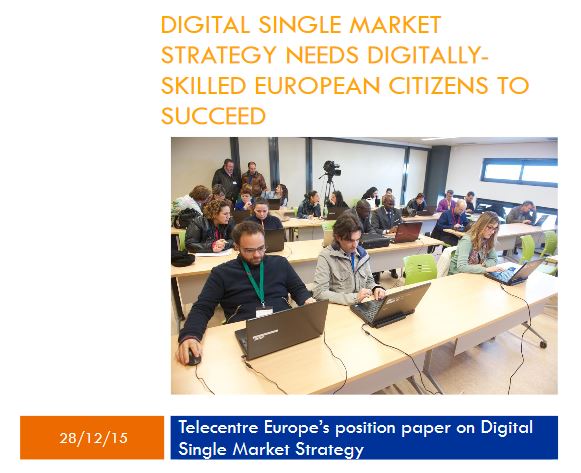17 Dec EC workshop on Technology and Refugee Integration
17 Dec, 2016
 On December 13th, Telecentre Europe took part in an expert workshop on the effective use of technology to support refugees’ integration organised by the European Commission’s Policy Lab team in Brussels . The workshop brought together stakeholders from different backgrounds: EU policy makers & scientists, governments and employment services, NGOs working with refugees, representatives of the tech industry, university and think-tank researchers and people with refugee experience. They discussed the main challenges the technology sector faces in its attempt to respond to migrants and refugees’ needs.
On December 13th, Telecentre Europe took part in an expert workshop on the effective use of technology to support refugees’ integration organised by the European Commission’s Policy Lab team in Brussels . The workshop brought together stakeholders from different backgrounds: EU policy makers & scientists, governments and employment services, NGOs working with refugees, representatives of the tech industry, university and think-tank researchers and people with refugee experience. They discussed the main challenges the technology sector faces in its attempt to respond to migrants and refugees’ needs.
To establish a shared knowledge among all the stakeholders, the recent report by Migration Policy Institute “Digital Humanitarianism” was presented and then discussed by Josephine Goube from Techfugees and Laurent Aujean from DG HOME, who also presented the European Action Plan on the integration of third country nationals.
In this first part of the workshop interesting ideas came to light. Participants discussed if governments should use technologies to provide traditional services or should delegate this to other organizations who can provide more innovative solutions. It was argued that refugees don’t need new tech tools, but adaptation of governmental services to their specific needs (e.g. language). Instead of generating countless new applications and tools, the tech sector should focus on helping with the “less sexy stuff”, i.e. managing capacity and infrastructure pressures, helping service providers and cracking data sharing.
Technology can also help asylum seekers while waiting for refugee status (which can take up to 2-3 years) in the fields of education and training, inclusion in society and entrepreneurship and opportunities. Participants agreed that a true partnership between relevant stakeholders is needed to scale up the initiatives and make them more accessible, avoid duplication, and reach the whole potential of technology to support this humanitarian crisis.
The topic of technology and its role in the integration of refugees is extremely broad and participants split into five work groups to tackle five different aspects of it:
- Securing refugee access to education and training
- Making it easier for employers to provide decent jobs for refugees and for refugees to access these jobs
- Stimulating innovation in the delivery of public services to refugees and local communities
- Empowering refugees to support themselves and to become entrepreneurs
- Supporting existing civil society organizations

Then each work group split into smaller teams and came up with 3 challenges and participants formed teams around the challenge they preferred to develop action-plan ideas. Finally, some common conclusions and final remarks were shared, as well as existing examples concerning the effective use of technologies or the dissemination and awareness raising role of social media.
The workshop touched relevant matters and raised interesting ideas. The interactive methodology led to a dispersion of the focus and the lack of concrete conclusions and follow up actions, as there were too many aspects of the topic to address. But it was a first step and we are looking forward to continue the dialogue on this interesting topic. Even more so because when speaking about technology and refugee integration, technology was mainly seen as a tool, as a mean to facilitate the group’s integration in society and the labour market.
Nonetheless, we at Telecentre Europe believe in the importance of refugees’ digital literacy and skills to get decent jobs, which was not highlighted enough. The gap between supply and demand of digitally skilled workers is growing in every sector of the economy, so education in digital skills and competences will be key for refugees’ integration in the labour market. Specific measures should be taken in this regard if we want to achieve an effective and long-lasting integration of refugees and migrants in European societies and economies.








